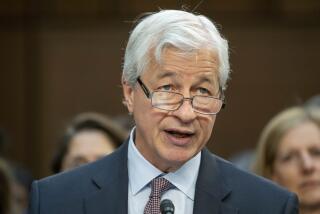U.S. Chamber warns Washington not to overreact to JPMorgan loss
- Share via
WASHINGTON — As JPMorgan Chase & Co. Chief Executive Jamie Dimon prepares for another day on the congressional hot seat this week, the U.S. Chamber of Commerce warned lawmakers and regulators not to overreact to the bank’s huge trading loss.
“Hiding money in a mattress isn’t a strategy for a growing, prosperous, economy, but that seems to be the road some want us to go down,” Thomas Quaadman, vice president of the U.S. Chamber’s Center for Capital Markets Competitiveness, wrote on the business group’s blog Monday. “No risk, no reward, no growth, no job creation. Anyone wonder why the growth and job-creation numbers are so anemic?”
Quaadman’s warning came ahead of Dimon’s appearance Tuesday before the House Financial Services Committee to discuss the bank’s trading loss of more than $2 billion. The committee also will hear from key regulators, including Mary Schapiro, chairwoman of the Securities and Exchange Commission, and Thomas Curry, the Comptroller of the Currency, as lawmakers examine bank supervision and risk management in the wake of the JPMorgan controversy.
Dimon is expected to face tougher questioning by House members, particularly Democrats, than he did before the Senate Banking Committee last week. Among the questioners will be Rep. Barney Frank (D-Mass.), one of the driving forces behind the Dodd-Frank financial reform law enacted in 2010, who has been critical of Dimon’s lobbying to soften the law’s implementation.
The Chamber of Commerce, which strongly opposed Dodd-Frank, equated calls for reduced risk in the banking industry to fears that pedestrians have of getting hit by a bus.
“Sure, sitting at home eliminates the risk of being hit by a bus, but your chances of dying in a fire rise dramatically,” Quaadman said. “Just further proof that you can’t eliminate risk, but only transfer it and often in a more harmful and catastrophic way.”
Banks need to be able to engage in trading to hedge their risk, something the Volcker Rule could severely hamper, he said. The rule, still being finalized by regulators, tries to reduce excessive risk-taking by limiting the ability of banks to trade with their own funds.
Other pending limits on banks, such as requirements they hold more capital to offset losses, could hurt the U.S. economy, he said.
“At the end of the day, all these hurdles end up at the doorstep of the corporate treasurer,” Quaadman said. “So when the treasurer can’t get a loan, is prohibited from mitigating risk and is shut out of the debt and equity markets thanks to all of these regulations, it will be businesses, not banks, that will find themselves in a vise.”
RELATED:
JPMorgan Chase’s huge loss exposes the risky side of banks
Regulator unaware of JPMorgan loss until weeks before disclosure
JPMorgan CEO gives ‘A-plus’ performance in Capitol Hill testimony
More to Read
Inside the business of entertainment
The Wide Shot brings you news, analysis and insights on everything from streaming wars to production — and what it all means for the future.
You may occasionally receive promotional content from the Los Angeles Times.










